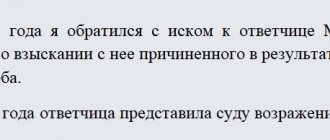In civil and arbitration proceedings, the parties to the case are mainly the plaintiff and the defendant. The defendant is the person to whom a demand is made for something (for example, to perform an action or to refuse to act). The defendant may be a proper or improper person in a court hearing. In order to act as a defendant in court hearings and defend his rights in a particular case, a person must be recognized as appropriate, otherwise, they can replace him with an appropriate defendant or attract a second defendant if the replacement refuses.
ATTENTION : our lawyer in civil cases will help resolve the issue of replacing an inappropriate defendant: professionally, on favorable terms and on time. Call today!
Determining the proper defendant
An improper defendant is a person who is not liable for the claim; he should not answer and fulfill the requirements of the statement of claim. The proper defendant in the case can be identified using the documents provided by the plaintiff, on the basis of which it will be clear that this person should be held liable in the case.
Depending on the case to be considered, various documents are presented, for example, if it is a family dispute, then as evidence you can provide the child’s birth certificate, where the father is included, or a marriage certificate. If this is a dispute between companies, for example, about debt collection, then you can provide a reconciliation report, letters of guarantee, contracts, agreements, etc.
The main thing is that all documents confirm the fact that the defendant in the case must be the person indicated in these documents.
Briefly about the main thing
Based on the above, we can draw brief conclusions about the situation when there is an inappropriate plaintiff in the case:
- The concept of “inappropriate plaintiff” is not defined in civil law, but is quite widely interpreted in scientific legal literature.
- At the stage of filing a claim, the court may return it if it immediately determines that it is being filed by an inappropriate person.
The claim is returned to the applicant
- The plaintiff is proper if there is a violation of his legal rights and interests.
- An improper plaintiff appears in a case when he and the judge cannot correctly determine what rights he has.
- If a claim is filed by an improper person, the claims under the claim will not be satisfied in any case.
Elimination of improper defendant
If, during the preparation of the case or at the stage of trial in the first instance (before the decision on the case is made), it turns out that the defendant is improper, he can be replaced by a proper one. It is prohibited to make a substitution in the appellate and subsequent instances.
The replacement of an improper defendant is carried out at the initiative or request of the plaintiff. In order to exclude a defendant, the plaintiff must state the grounds for finding him inappropriate. Based on the replacement of the defendant, the court makes a ruling and the consideration of the case begins from the very beginning.
The plaintiff may not agree with the court on the exclusion of the defendant, then the court, with the consent of the plaintiff, can involve him in the case as a second defendant, or if the plaintiff does not agree, consider the case as is, but in this case there is a high chance of receiving a refusal to satisfy the stated claims.
Also, if there are two or more defendants, an improper defendant may be expelled, although such a procedure is not provided for by law, but is applied in practice. The plaintiff, when filing a claim against several defendants, actually excludes several and does not make a replacement.
Procedure for bringing the proper plaintiff into the case
The civil law directly states that the court, on its own initiative, cannot replace the plaintiff or any other third party who is the author of the claims, i.e. makes independent demands on other participants in the case.
It turns out that the court itself cannot decide to replace the plaintiff.
However, if the plaintiff, recognized as improper, gives written consent to his replacement by the proper participant, then the proper subject of law will be introduced into the case, and the improper one will be removed from the case.
In this case, the consent of the second party to the case (the defendant) is not required.
If the improper plaintiff does not consent to his conclusion from the case, then in this case the court will introduce the proper subject of law into the case as a third party.
In this case, the possible proper plaintiff himself must express a desire to join the case. If he does not show such zeal and does not want to sue the defendant at all, then the court cannot force him to do so.
There is a dispute over who is the proper participant in the case.
If all consents are received and the issue of replacement by the appropriate person is resolved, then the court will replace the participants by issuing a ruling. Once a proper plaintiff has been brought into the case, the case will be tried from the very beginning. Those actions that were carried out earlier will not have any meaning for the new participant.
Objections: improper defendant
When a person receives a copy of a statement of claim where they are named as a defendant, it may be in error. The plaintiff could have made a mistake in spelling, or mixed up the names of the companies (surnames). If the defendant deliberately thinks that he is not a party to the dispute regarding this statement, he can write objections to the statement. Objections are drawn up in writing and submitted to the court where the claim is pending.
The objection to the statement of claim must indicate the following:
- In the content of the application, it is necessary to indicate on what dispute (case) these objections are being filed;
- Indicate the requirements with which the defendant does not agree about his involvement in the consideration of the case, indicate the reasons why he cannot be a defendant;
- The objection must be accompanied by relevant documents, on the basis of which it can be understood that the person is wrong in presenting the demands to him.
USEFUL : read about objections to a claim in civil proceedings at the link
The Supreme Court explained how to notify the defendant about the process
The defendant and other persons who do not know about the case must be notified about it. The Supreme Court reminded how to do this correctly in one of its recent proceedings. There, Irina Filippenko* filed a claim against Pavel Matveichik* for recognition of ownership of land due to acquisitive prescription. Filippenko claimed that she bought the plot by verbal agreement, but did not register it legally. The defendant was not involved in the case. But the courts left the claim without satisfaction. Filippenko complained to the Supreme Court, which found several violations in the decisions, including improper notification of the defendant.
It turned out that the court notified Matveychik by telegram to the address that was listed in the statement of claim. The telegram was returned with the note “the addressee does not live at the specified address.” But this is not enough, the Supreme Court pointed out (Definition No. 4-КГ20-16). If the location of the defendant is unknown, it is necessary to establish not only that “the addressee does not live,” but also that “the new location of the defendant is unknown” (Part 4 of Article 116 of the Code of Civil Procedure, Article 119 of the Code of Civil Procedure). This must be confirmed by housing maintenance authorities or representatives of local administration, the Supreme Court indicated. He did not find any notice or data in the file that would confirm the unknown whereabouts of Matveychik.
So it turned out that the case was considered without a defendant. For example, they did not ask him why he stopped using the land.
As a result, the case was sent for review. “The lower court committed a procedural violation,” comments the senior lawyer of SSP-Consult SSP-Consult Regional Rating. group Labor and migration law (including disputes) group Arbitration proceedings group Bankruptcy (including disputes) group Dispute resolution in courts of general jurisdiction Company profile Irina Kurilskaya. – After receiving the telegram, he should have, in accordance with Art. 119 of the Civil Procedure Code, send a request to the migration department of the Main Directorate of the Ministry of Internal Affairs of Russia in the relevant region in order to establish the defendant’s new place of residence and send a notice there.” According to Kurilskaya’s observations, it is the migration registration authorities that have up-to-date information about the place of residence or stay, but housing maintenance authorities usually do not.
Two approaches
As the Supreme Court pointed out in the case, housing maintenance authorities or representatives of local administration must confirm to the court that the defendant’s new address is unknown to them. This is the position from the Determination of the Civil Collegium of the Supreme Court dated August 11, 2009 No. 4-B09-26. “It was relied upon by the appellate authorities, which overturned the decisions of the first instance on procedural grounds,” recalls Kurilskaya. To prevent such cancellations, the courts make many attempts to notify the participant in the case.
This approach means that the court is actually searching for the defendant. This idea is approved by Anna Vasilyeva from AB Kachkin and Partners Kachkin and Partners Federal Rating. PPP group/Infrastructure projects group Land law/Commercial real estate/Construction Company profile. In her opinion, the court is obliged to check the defendant’s address if he does not receive notice. Otherwise, his rights may be violated if he does not know about the lawsuit against him. And sometimes plaintiffs specifically indicate the wrong address of defendants, Vasilyeva points out.
Courts must make the necessary inquiries to determine the defendant's place of residence in order to ensure his right to judicial protection. This is necessary for the normal functioning of the judicial system.
Anna Vasilyeva, AB Kachkin and Partners Kachkin and Partners Federal rating. PPP group/Infrastructure projects Land law group/Commercial real estate/Construction Company profile
But in judicial practice there is also an opposite – more modern – approach. It is based on Art. 165.1 of the Civil Code, which came into force in 2013. According to this article, “a message is considered delivered even when it was sent to the addressee, but for reasons depending on him, was not delivered to him or the addressee did not familiarize himself with it.” In 2015, Resolution No. 25 of the Plenum of the Supreme Court was issued, which stated that Art. 165.1 of the Civil Code also applies to judicial notices and summonses, unless civil procedural or arbitration procedural legislation provides otherwise (clause 68). “Many courts of general jurisdiction are guided by this approach,” shares Kurilskaya. – If notifications are not received at the place of registration, this does not mean that the notification was improper. Taking all the circumstances into account, the courts regard this as a refusal to receive judicial notice.”
Kurilskaya cites case No. 33-28775/2019 as an example. There, the Moscow City Court rejected the defendant’s complaint that he was not notified of the consideration of the case. After all, the district court sent a telegram to his registered address. It was not delivered because the recipient of the notice left did not show up to receive the telegram. There was no information in the case about the defendant’s other place of residence. Such behavior should be understood as a refusal to receive notification, MGU indicated. As the appeal confirmed, the court did everything that was required of it, and the defendant could have received notice if he had acted in good faith.
In addition, the MGU rejected the defendant’s argument that the plaintiff misled the court because he deliberately concealed the defendant’s actual residential address. “The defendant did not present any evidence to support this circumstance,” the appeal ruling states.
The party to the proceedings is responsible for failure to receive court correspondence. Obliging the court to record the fact of a person’s absence at the address with the help of housing maintenance authorities is a relic that can delay the trial.
Irina Kurilskaya, SSP-Consult SSP-Consult Regional rating. group Labor and migration law (including disputes) group Arbitration proceedings group Bankruptcy (including disputes) group Dispute resolution in courts of general jurisdiction Company profile
* – names and surnames have been changed by the editors.
- Evgenia Efimenko
- Supreme Court of the Russian Federation
- Civil process
Procedure for replacing an improper defendant
The procedure for replacing an improper defendant in civil and arbitration proceedings is the same. To replace the defendant, the will of the plaintiff is sufficient, since replacement is made only at the initiative or at the request of the person. The defendant is replaced in the following order:
- Identification of an improper defendant (for example, the defendant’s failure to comply with the documents submitted to the court, the defendant’s submission of objections);
- Petition of the plaintiff (drawn up in writing);
- Satisfaction of the court's request to replace the inappropriate defendant;
- A court ruling to replace an inappropriate defendant.
- After replacing the inappropriate defendant, the consideration of the case begins from the very beginning.
Based on the law, the plaintiff may refuse to replace the defendant in such a case; the defendant can be brought in as a second defendant, but also only with the consent of the plaintiff. The plaintiff may refuse such an undertaking, then the court will consider the claim on its merits, but in the event of identified violations or inconsistencies, the claim cannot be satisfied.
The court itself cannot replace an improper defendant with a proper one; only if it is impossible to consider the case on the merits, it can independently attract co-defendants for the correct consideration of the case.
Circumstances of occurrence of an “inappropriate plaintiff”
As a result of the applicant’s misconceptions, the following picture emerged:
- in a particular situation, the applicant had no legal grounds for filing a complaint, since in fact his interests were not affected;
- the citizen filed a petition asking for legal protection of the other party, although in reality he could not do this. For example, a parent wrote a statement on behalf of their child because they believed it was the right thing to do. But in certain situations, a teenager must submit appeals independently;
- the petitioner does not have civil capacity and does not have emancipated status. Such options are possible, firstly, when the complainant is a minor (there are exceptions to the rules, they are taken into account in each specific case). Secondly, the person is declared incompetent, for example, due to mental illness.
The inappropriate party, from a legal point of view, has no legal basis to be the applicant, therefore, he cannot participate in the consideration of the issue.
Petition to replace an improper defendant
Petitions to arbitration and courts of general jurisdiction are drawn up according to one standard form. The petition states the following:
- The name of the court to which the petition is filed, you can also indicate the judge, the case number;
- Name of the parties to the case (if individuals are full names, their details), address, telephone number, or name of the party’s representative;
- The contents of the petition indicate the case number, the parties, the subject of the claim (what there is a dispute about);
- It must contain information that the claim has been brought against that person, and the article on the basis of which this person must be replaced (indicate who to replace);
- Attachments to the petition, documents necessary to confirm the replacement of defendants.
The petition is submitted in free form and is considered by the court; after consideration, the court issues a ruling on replacement.
USEFUL : watch the video and find out why it is better to draw up any sample claim or complaint with our lawyer, write a question in the comments of the video, subscribe to the YouTube channel
Controversial issues of refusal to accept a claim
We especially note that clause 1, part 1, art. 134 of the Code of Civil Procedure of the Russian Federation provides that a claim will be refused if it is filed in defense of the interests and freedoms of another person by a citizen who does not have the right to do so established by law, or if the plaintiff challenges acts that do not affect his interests. Challenging acts involves the applicant's claims that his interests are infringed by their content; the defendant in this situation is the authorities and officials.
Having found that the plaintiff is inappropriate (not in cases of appealing acts), the courts sometimes refuse to accept the claim on the basis of the above paragraph, since the plaintiff protects the interests of another person, and not his own.
However, some legal scholars believe that this provision applies more to situations where a certain category of persons, for example, those specified in Articles 44 and 45 of the Code of Civil Procedure of the Russian Federation (prosecutor, guardians, trustees, legal representatives), do not have the right to support claims against other citizens .
Also, even if the rights of the plaintiff are not violated, he still files an application in defense of his own, as he subjectively believes, interests, and not of third parties. Therefore, the use of this part of the article to refuse an improper plaintiff is controversial.
When accepting a claim, the court rarely knows that the plaintiff is not the person whose rights have been violated, and that the defendant indicated in the statement is actually a violator of interests in the dispute. Therefore, often both parties are simply considered in absentia as legitimate subjects of legal relations in civil proceedings, and all issues are resolved during the consideration of the case.
Co-defendant in civil proceedings
The involvement of a co-defendant most often occurs because the investigation has discovered new circumstances of the case or the course of the investigation was initially incorrect/partially correct. As soon as two or more persons appear on the defendant's side, they are all called co-defendants.
It is possible to involve a person who has not previously been involved in the trial in the progress of the case both at the stage of initiating the process (filing a statement of claim) - in this case, this is entirely the initiative of the plaintiff, and directly during the trial.
Types of complicity
Depending on the circumstances of the case, the co-defendant can play a different role in it - the type of complicity and the degree of involvement of the new participant in the proceedings is determined by the judge.
There may also be additional participants in the process on the plaintiff’s side – they are called co-plaintiffs. A process involving several co-plaintiffs is active complicity. When it comes to the presence of several co-defendants, this is already passive complicity. Complicity can be mixed if the case has signs of both.
Reasons for involving co-defendants
The plaintiff is primarily interested in attracting a co-defendant - the presence of an additional person on the defendant’s side can give a better result. Also, changing the status of a person from, for example, a witness to a defendant changes his degree of involvement in the process, and therefore legal responsibility.
Main reasons:
- It is assumed that the person has a high degree of knowledge or involvement regarding the litigation and can provide the court with additional opportunities for proceedings.
- New circumstances of the case have come to light, from which it is obvious that the status of the person should be changed to defendant.
Arbitrage practice
It is better to follow the procedural procedure for replacing the defendant using the materials of specific cases. As a rule, the very fact of incorrect determination of the guilty party is revealed by the judges at the stage of preparation for the debate, but the plaintiff himself petitions to replace the defendant.
The Zheleznodorozhny District Court of Kursk, in the process of preparing A.’s claim against M., the chairman of the Mokva gardening partnership, for the recovery of damages for damage to property during road work, came to the following conclusion. The claim is brought against a person who cannot be a party to the trial due to the lack of a causal connection between M.’s actions and the occurrence of negative consequences for A. The plaintiff petitioned to forward the claim to a legal entity (the Mokva gardening partnership).
The petition was granted, and the claim was forwarded to the district court at the location of the partnership.









